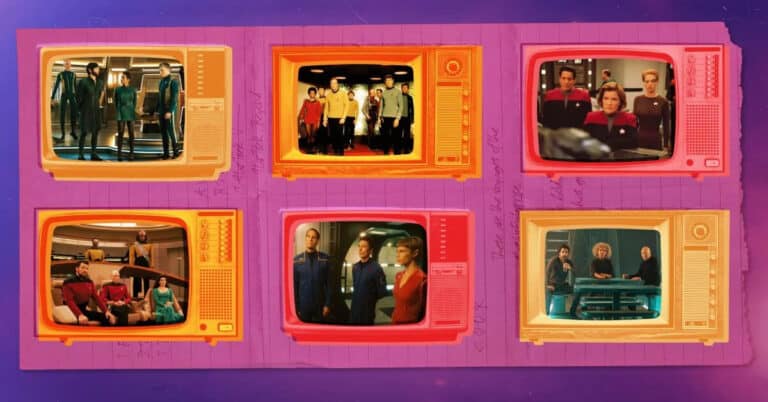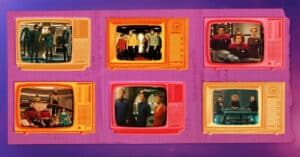Over 40 years ago, Star Trek boldly beamed its way from TV screens to the cinematic galaxy with its inaugural blockbuster, 1979’s Star Trek: The Motion Picture. Since that stellar beginning, the Trekverse has grown to include a cosmic buffet of 13 movies and a dozen series (and counting!). If you find navigating this expansive Federation universe more challenging than warp speed, fear not! There’s a simple entry point—just follow the movie timeline for a journey through the stars that’s as thrilling as a Klingon encounter! So, let’s dive into the final frontier together and figure out how you can catch up on the adventures of Kirk, Picard, Janeway, Sisko, Spock, Pike, Archer, Burnham, and the entire stellar crew that has made Star Trek a galactic sensation for the past 56 years. Ready for this cosmic journey? Ready to watch Star Trek in order? Engage!
What will you see here?
Star Trek: Enterprise
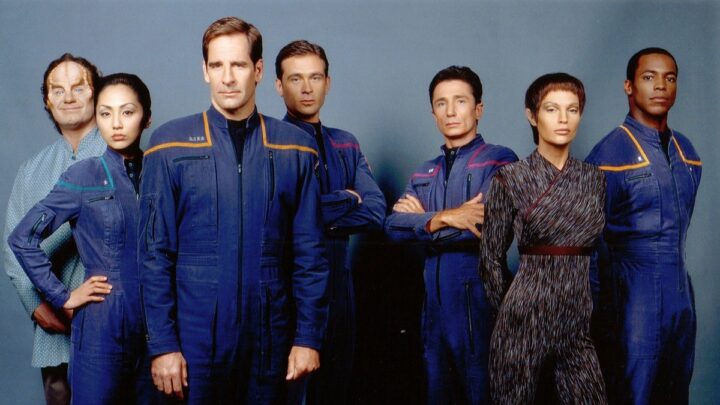
Star Trek: Enterprise is a prequel to the iconic franchise, set in the 22nd century, chronicling the early days of space exploration. Captain Jonathan Archer helms the first starship, Enterprise NX-01, as humanity takes its initial steps into deep space. Facing encounters with new species, interstellar politics, and the mysterious Temporal Cold War, Archer’s crew strives to establish peaceful relations and uphold Earth’s reputation. The series explores the birth of the United Federation of Planets, laying the foundation for future Star Trek adventures. Enterprise offers a fresh perspective on the galaxy’s uncharted territories, blending science fiction with humanity’s pioneering spirit.
Star Trek: Discovery: Seasons 1 and 2
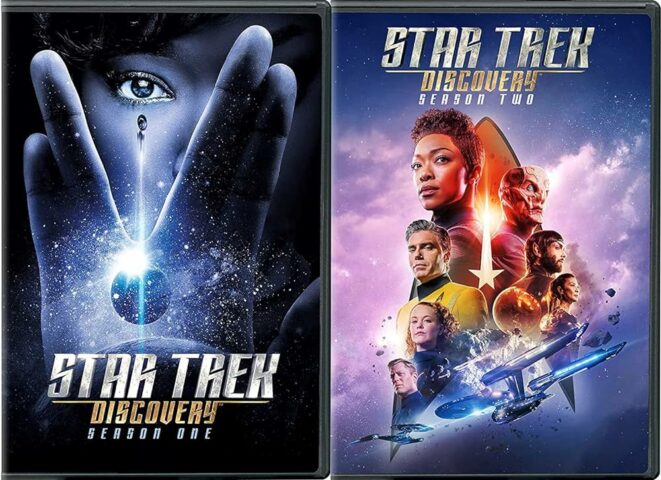
Star Trek: Discovery unfolds in two dynamic seasons, steering the audience through a gripping narrative. In Season 1, the series introduces Michael Burnham, a disgraced Starfleet officer, amid a war with the Klingons. The Discovery, a cutting-edge starship with a unique spore drive, becomes a focal point in the conflict. As Burnham grapples with ethical dilemmas, the crew unravels a mysterious conspiracy.
Season 2 takes the crew on a time-bending journey, encountering iconic figures like Captain Pike and Spock. The narrative delves into a galaxy-altering threat known as the Red Angel, exploring the complexities of faith and artificial intelligence. Both seasons showcase Discovery’s intense exploration of the Star Trek universe.
Star Trek: Strange New Worlds
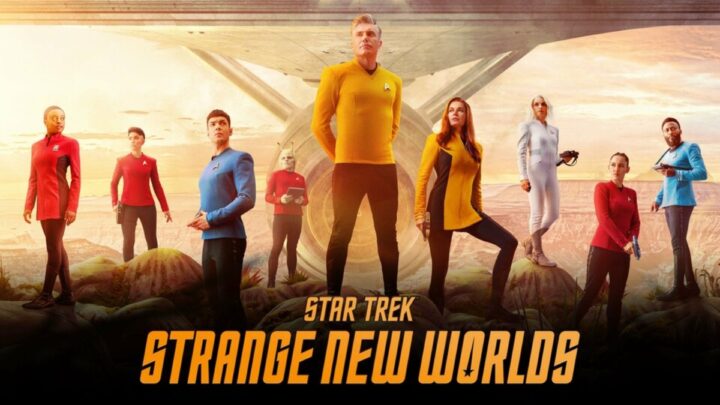
This one kicks off before Star Trek: The Original Series events and comes as a follow-up from Star Trek: Discovery. Anson Mount takes the captain’s chair as Christopher Pike, a familiar face for those who remember the original failed pilot episode “The Cage” of Star Trek: The Original Series. If the name rings a bell, Pike was James T. Kirk’s predecessor after Jefferey Hunter, the original actor, stepped away from the show.
Now, in the present day (our present day in the Star Trek universe), we get to unravel the story of Christopher Pike and other beloved characters from The Original Series alongside some fresh faces. What makes it even more special is that they’re cruising through space in none other than the U.S.S. Enterprise NCC-1701 – the very ship that would soon be under the command of Captain Kirk himself. Talk about a blast from the cosmic past!
Star Trek: The Original Series
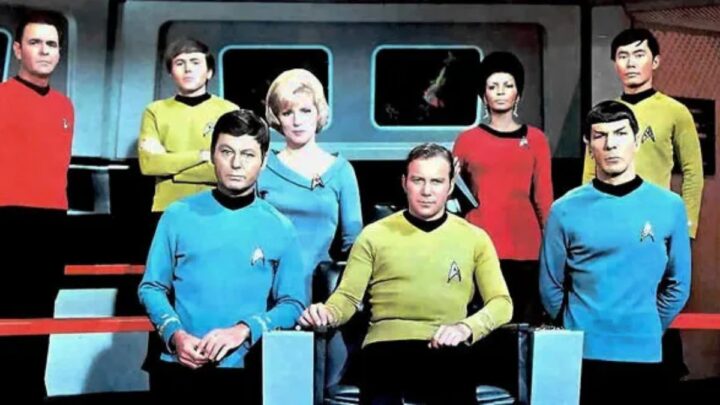
“Star Trek: The Original Series” catapults viewers into the cosmos with Captain James T. Kirk and the iconic crew of the USS Enterprise. A groundbreaking sci-fi masterpiece of the 1960s, it explores the final frontier, encountering strange new worlds and civilizations. Kirk, Spock, and McCoy lead the way, tackling moral dilemmas, interstellar politics, and extraterrestrial oddities. With memorable phrases like “Beam me up, Scotty” and the first interracial kiss on American TV, it left an indelible mark on pop culture. The series’ blend of adventure, philosophy, and camaraderie laid the foundation for the enduring Star Trek legacy. Engage for a timeless warp-speed journey!
Star Trek: The Animated Series
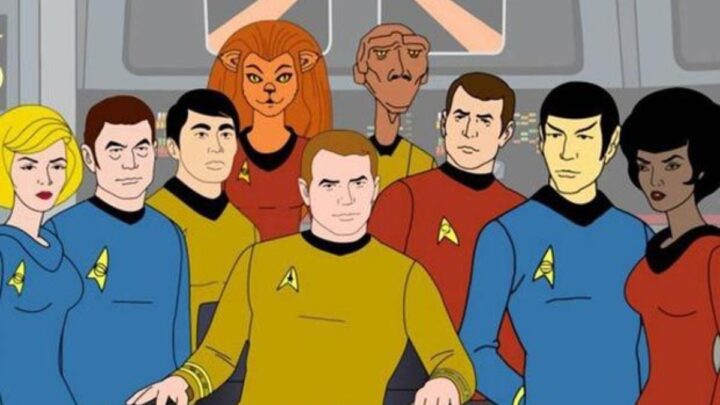
“Star Trek: The Animated Series” beams fans back into the Star Trek universe with an animated twist. A continuation of the original series, it maintains the adventurous spirit of Captain Kirk, Mr. Spock, and the USS Enterprise. Airing in the ’70s, this often-overlooked gem features the original cast’s voices, bringing the beloved characters to life in animated form. The series explores new realms, introduces intriguing alien species, and delves into scientific phenomena with a dose of animated creativity. Although short-lived, it contributes unique tales to the Star Trek tapestry, making it a delightful and often underestimated chapter in the franchise’s journey through the cosmos.
Star Trek: The Motion Picture
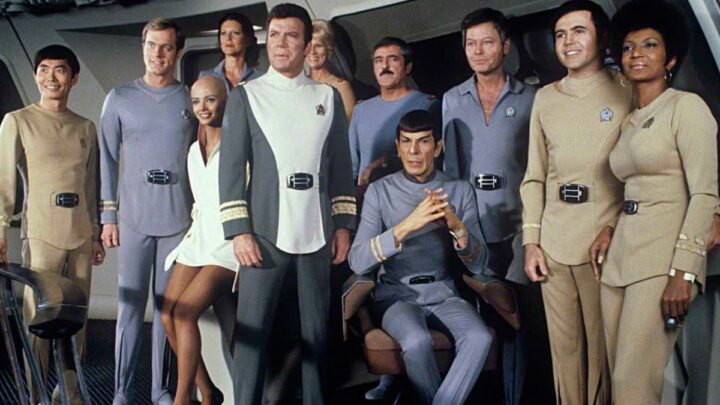
The first Star Trek film was a game-changer, marking the crew’s return from Star Trek: The Original Series after the show bid farewell in 1969 with just three seasons under its cosmic belt. However, getting this film to theaters wasn’t a walk in the park. Gene Roddenberry faced an uphill battle trying to convince Paramount Pictures it was worth the shot in 1975. Fortunately, the success of Close Encounters of the Third Kind and some cosmic alignment of factors persuaded the higher-ups to greenlight the movie, scrapping plans for a new TV series called Star Trek: Phase II, which would have continued the original story.
Now, in Star Trek: The Motion Picture, James T. Kirk has climbed the ranks to become an Admiral in Starfleet. A mysterious alien energy cloud named V’Ger shakes things up, prompting Kirk to take command of a revamped U.S.S. Enterprise. Familiar faces join him for another round of intergalactic adventures. The saga lives on, and Kirk is back in action! Watch the Star Trek in order with this watch guide.
Star Trek II: The Wrath of Khan
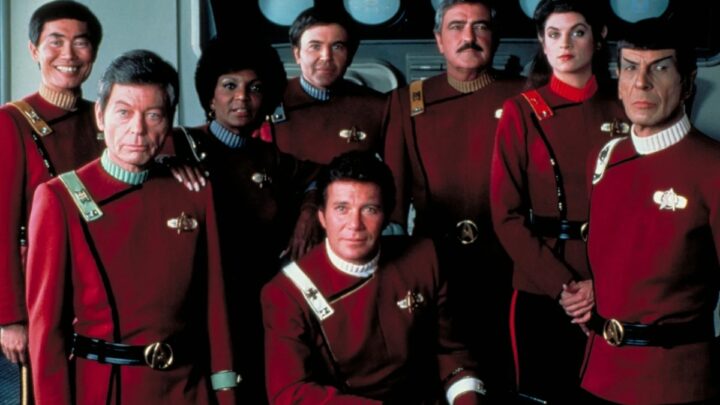
“Star Trek II: The Wrath of Khan” is a cinematic tour de force that propels the Star Trek franchise to new heights. Released in 1982, it pits Admiral James T. Kirk against the vengeful Khan Noonien Singh, a formidable adversary from the original series. Fueled by Ricardo Montalbán’s memorable performance, the film weaves a tale of revenge, sacrifice, and the test of friendship. The intense space battles, emotional depth, and the iconic “KHAN!” moment make it a fan favorite. “The Wrath of Khan” not only revitalized the Star Trek film series but left an enduring impact, earning its place among the most revered entries in the Starfleet chronicles.
Star Trek III: The Search for Spock
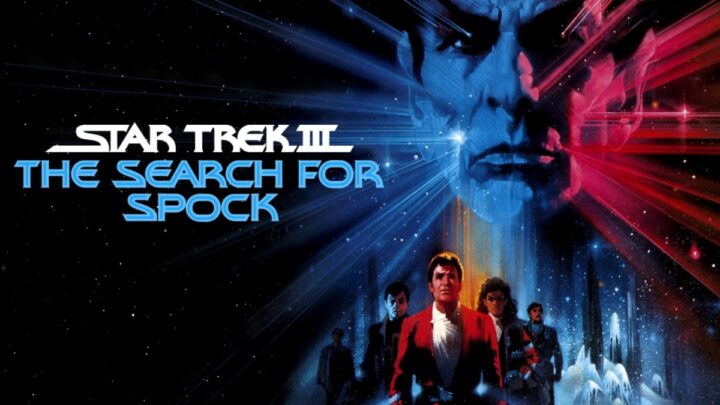
“Star Trek III: The Search for Spock” continues the epic journey of the USS Enterprise crew, picking up where “The Wrath of Khan” left off. Released in 1984, this installment directed by Leonard Nimoy explores themes of loyalty, sacrifice, and resurrection. As the crew copes with the aftermath of Khan’s attack, they embark on a mission to retrieve and revive the beloved Spock. The film delivers emotional resonance, and intricate storytelling, and introduces the Genesis Device—an invention with the power to create or destroy life. “The Search for Spock” solidifies the bond among the Enterprise crew and sets the stage for the ongoing sagas in the Star Trek cinematic universe.
Star Trek IV: The Voyage Home
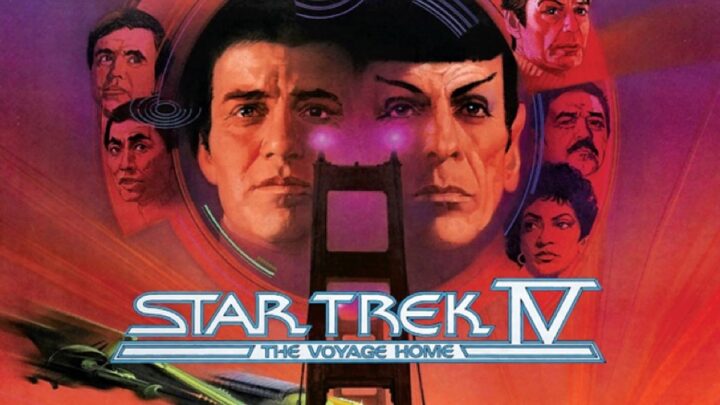
“Star Trek IV: The Voyage Home” takes the crew of the USS Enterprise on a time-traveling escapade, injecting humor and environmental themes into the franchise. Released in 1986, directed by Leonard Nimoy, the film follows the crew as they journey to 20th-century Earth to save the planet by finding a pair of humpback whales. The juxtaposition of futuristic characters in a contemporary setting provides comedic moments and social commentary. Renowned for its lighthearted tone and environmental message, the film stands out as a unique and entertaining chapter in the Star Trek film series, showcasing the crew’s resourcefulness beyond the stars.
Star Trek V: The Final Frontier
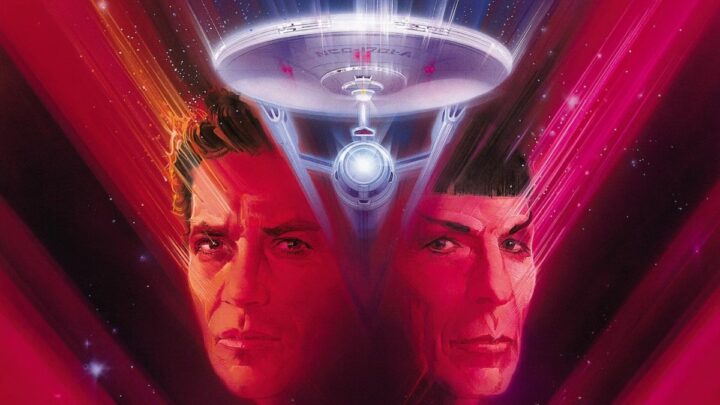
“Star Trek V: The Final Frontier” ventures into uncharted territory, exploring the spiritual and existential realms of the Star Trek universe. Released in 1989 and directed by William Shatner, who also stars as Captain James T. Kirk, the film follows the crew as they face a charismatic Vulcan named Sybok, who seeks the mythical planet Sha Ka Ree at the center of the galaxy. The journey unveils personal struggles and delves into the nature of belief. While not universally praised, the film offers moments of camaraderie, self-discovery, and philosophical reflection, adding a unique layer to the diverse tapestry of Star Trek adventures.
Star Trek VI: The Undiscovered Country
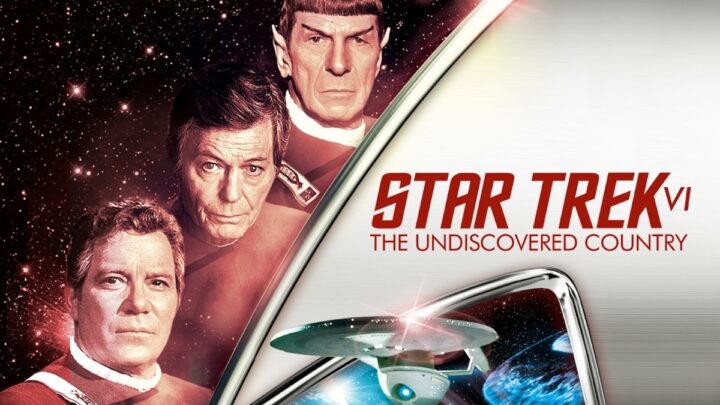
Star Trek VI: The Undiscovered Country marks the grand finale for the entire cast of Star Trek: The Original Series. This time, it’s all about the Klingons taking center stage. Picture this: a mining disaster shatters the Klingon moon of Praxis, posing a grave threat to their homeworld. Faced with impending doom, Klingon Chancellor Gorkon decides it’s time to shift gears from their warrior ways and seek peace with the Federation.
What unfolds is an interstellar adventure that echoes the real-world events of the fall of the Soviet Union and the Berlin Wall. It’s a poignant nod to history as the characters we’ve known and loved since 1966 navigate through political twists and turns. Star Trek VI: The Undiscovered Country serves as a heartfelt send-off to these iconic characters, though, fear not, some will thankfully reappear in future installments. It’s a cosmic farewell to an era that left an indelible mark on the hearts of Trekkies everywhere. Watch the Star Trek in order with this watch guide.
Star Trek: The Next Generation
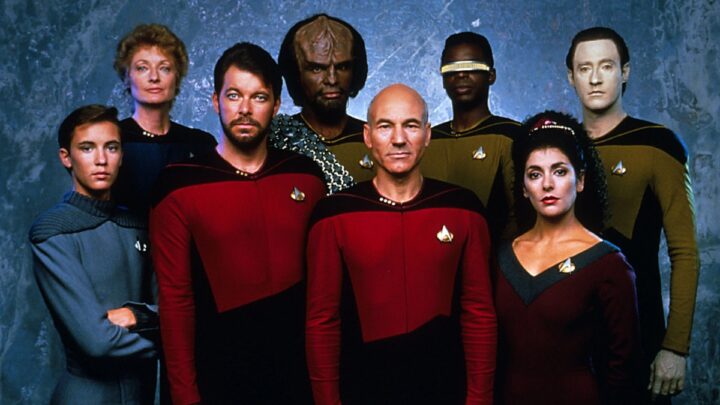
Prepare to embark on what many consider the crown jewel of the Star Trek series – Star Trek: The Next Generation. This cosmic journey, featuring Patrick Stewart as the distinguished Captain Jean-Luc Picard, spanned from 1987 to 1994, treating fans to a stellar 178 episodes over seven seasons.
The diverse crew, including android Lieutenant Commander Data, Klingon Worf, and empathic Counselor Troi, contributes to the series’ rich character dynamics. TNG explores complex narratives, emphasizing diplomacy over conflict, and introduces the Borg, a formidable collective threat. Seven Seasons showcases philosophical depth, innovative storytelling, and Picard’s iconic leadership. The series significantly expands the Star Trek lore, offering a utopian vision of the future while addressing contemporary social issues. Its enduring legacy cements “The Next Generation” as a pivotal chapter in the ongoing Star Trek odyssey.
Star Trek: First Contact
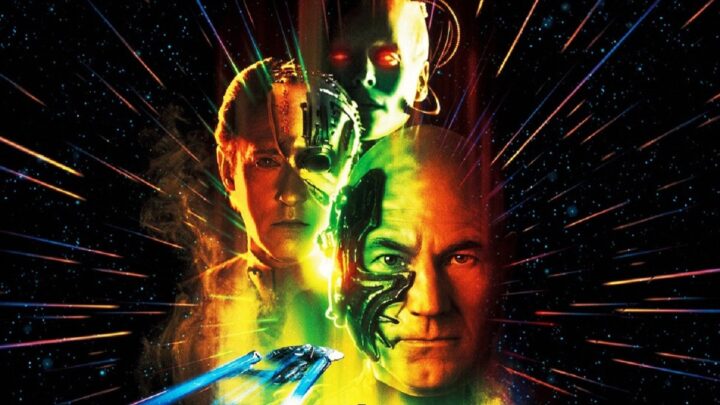
Let’s dive into the awesomeness of Star Trek: First Contact – not just the second flick with the Next Generation crew but also Jonathan Frakes’ debut as a director. How cool is that? Star Trek: First Contact propels the USS Enterprise-E into a high-stakes battle against the cybernetic Borg Collective. The narrative unfolds as the Enterprise crew travels back in time to Earth’s past to prevent the Borg from altering history. This thrilling installment combines action, character depth, and the resilience of the human spirit. The film explores themes of revenge, assimilation, and the consequences of tampering with the timeline. “First Contact” stands out as a gripping and impactful entry in the Star Trek film series, showcasing the enduring battle between humanity and the relentless Borg threat.
Star Trek: Insurrection
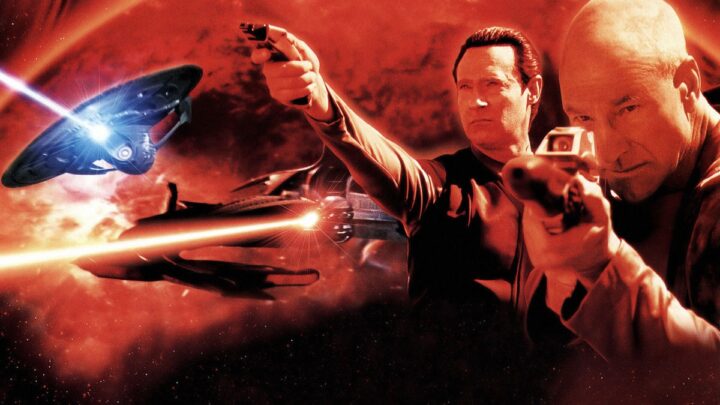
“Star Trek: Insurrection” takes the USS Enterprise-E and its crew on a morally charged mission, released in 1998. Directed by Jonathan Frakes, the film explores the Federation’s questionable actions in relocating a peaceful alien race from a planet with rejuvenating properties. Captain Jean-Luc Picard finds himself at odds with Starfleet’s orders, choosing to uphold the principles of the Prime Directive. The film balances action with philosophical dilemmas, delving into the ethical implications of sacrificing one society for the benefit of another. While not universally regarded as a standout entry, “Insurrection” contributes to the Star Trek canon by examining the Federation’s commitment to its principles and the limits of moral compromise in the pursuit of the greater good. The film adds nuance to the ongoing exploration of ethical challenges within the Star Trek universe.
Star Trek: Nemesis
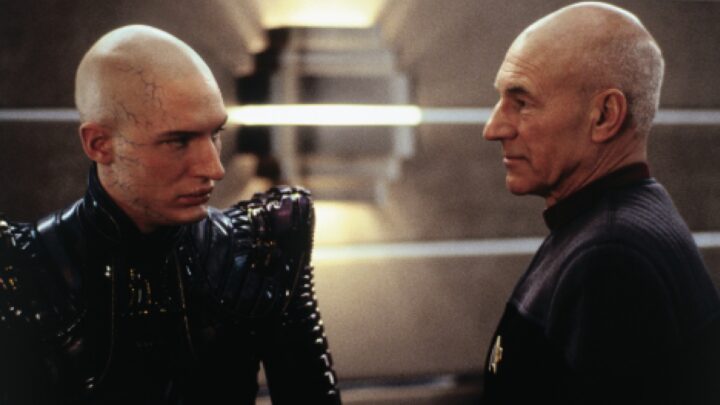
Ah, the curtain closes with Star Trek: Nemesis, the final chapter for our Next Generation heroes. It didn’t exactly hit the top of the charts in the “best Star Trek movies” list. It’s got its shining moments.
Check this out – Tom Hardy steps in as Shinzon, initially masked as a Romulan big shot. Plot twist: it turns out he’s a clone of none other than Captain Jean-Luc Picard. Talk about a bombshell! There are some cool interactions between our beloved TNG characters, but truth be told, it didn’t quite deliver the farewell fans were crossing their fingers for. The silver lining? This might not be the end of our favorite crew – there’s always hope for more adventures!
Star Trek: Deep Space Nine
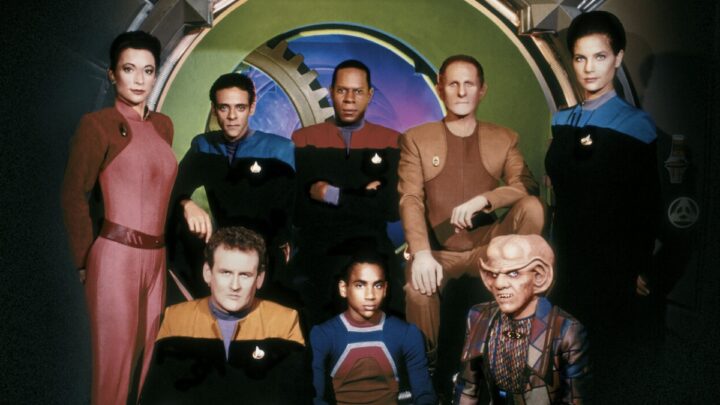
“Star Trek: Deep Space Nine” boldly diverges from the traditional Star Trek format, offering a complex narrative set on a space station near a strategic wormhole. The show, which aired from 1993 to 1999, centers around Commander Benjamin Sisko, a diverse crew, and alien allies. Deep Space Nine becomes a hub for political intrigue, war, and cultural exploration. Unlike its predecessors, it delves into serialized storytelling, tackling themes of war, faith, and identity. Characters like shape-shifter Odo, Bajoran Major Kira, and Ferengi Quark add depth to the series. The Dominion War, a galaxy-shaking conflict, showcases the darker side of the Star Trek universe. “Deep Space Nine” stands out for its narrative complexity, diverse characters, and willingness to push the boundaries of the franchise’s storytelling conventions. Watch the Star Trek in order with this watch guide.
Star Trek: Voyager
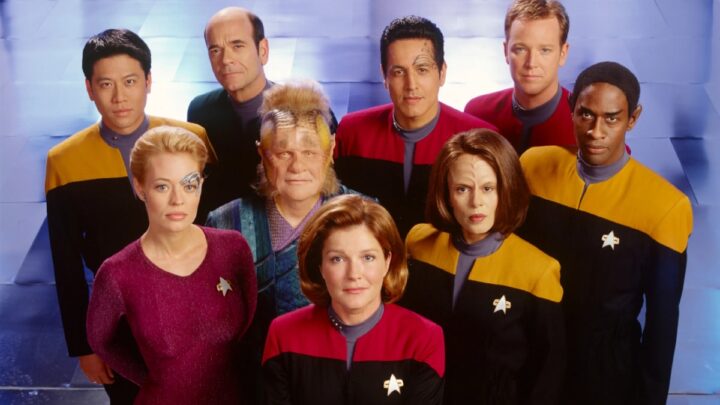
“Star Trek: Voyager” embarks on an enthralling journey as the USS Voyager, led by Captain Kathryn Janeway, becomes stranded in a distant part of the galaxy. Airing from 1995 to 2001, this series takes a unique twist with a Starfleet crew joined by Maquis rebels, forging an alliance for survival. The show explores themes of teamwork, resourcefulness, and the pursuit of a way home. Characters like the resourceful Seven of Nine and the holographic Doctor add depth to the diverse crew. Voyager’s encounters with new species, the enigmatic Borg, and the pursuit of a stable wormhole contribute to its rich narrative. “Voyager” stands as a testament to the resilience of the human (and non-human) spirit in the face of the unknown, making it a captivating chapter in the Star Trek saga. Watch the Star Trek in order with this watch guide.
Star Trek: Lower Decks
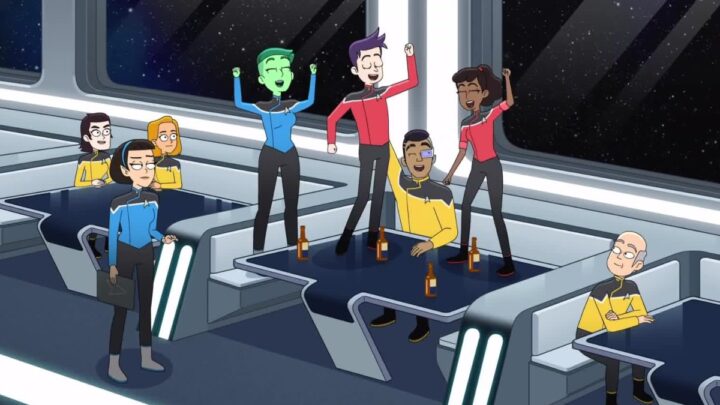
“Star Trek: Lower Decks” injects a dose of irreverent humor into the Star Trek universe. Offering a fresh perspective on life within Starfleet. Premiering in 2020, this animated series, created by Mike McMahan, focuses on the support crew of the USS Cerritos. Unlike the usual focus on senior officers. Lower Decks showcases the daily trials and comedic mishaps of ensigns striving to make their mark.
The series cleverly satirizes Star Trek tropes while maintaining an affectionate nod to the franchise’s legacy. With a mix of slapstick humor, pop-culture references, and unexpected character depth. Lower Decks charts its own course in the vast expanse of Star Trek storytelling. While not everyone’s cup of Earl Grey tea. It brings a lighthearted and amusing dimension to the diverse Star Trek tapestry.
Star Trek: Prodigy
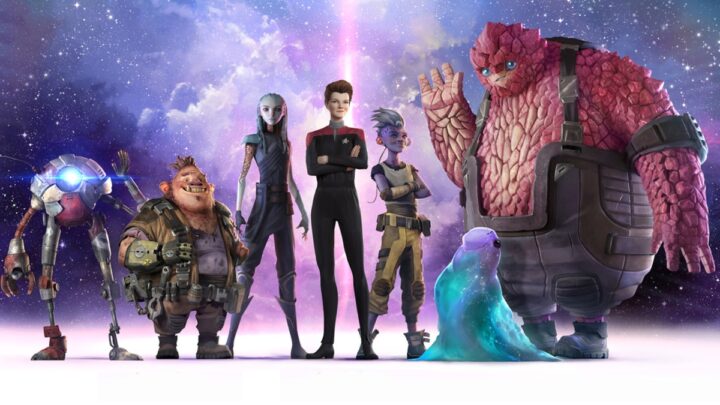
Jumping into the animated frontier, we’ve got Star Trek: Prodigy, breaking new ground as the first fully 3D animated Star Trek series. It picks up five years after the U.S.S. Voyager finally returns to Earth. Now, it’s tailor-made for the young crowd, telling the tale of a bunch of spirited aliens stumbling upon an abandoned Starfleet gem, the U.S.S. Protostar. Their mission? Trek across the galaxies from the Delta Quadrant to reach Starfleet and the Alpha Quadrant.
Now, Voyager aficionados, brace yourselves – Kate Mulgrew makes a grand return as Kathryn Janeway. But hold on, it’s not just her usual self; she’s also the Emergency Training Holographic Advisor, based on her likeness. How cool is that?
But, here’s a twist in the plot – the second season, set to be filmed later this year, got a bit of a surprise cancellation in June and was yanked off Paramount+. Fingers crossed that this animated gem might find a second home on another streaming service or network. There’s always hope in the vastness of the streaming universe! Watch the Star Trek in order with this watch guide.
Star Trek: Picard
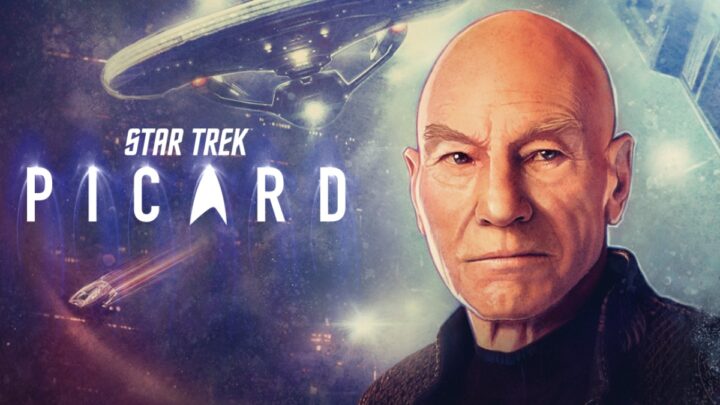
Now, let’s talk about the intergalactic homecoming that is Star Trek: Picard – the “next generation” of The Next Generation, bringing back no other than Patrick Stewart’s iconic Jean-Luc Picard and many familiar faces from the OG series. Talk about a reunion!
So, the story unfolds two decades after the chaos of Star Trek Nemesis, finding Picard in retirement mode, chilling at his family vineyard in France. But hold onto your warp drives – certain events kick our beloved captain back into action, taking him on a three-season, 30-episode rollercoaster through space and time.
Now, let’s be real – every journey has ups and downs, and Picard’s adventure is no exception. But, in our humble opinion, the third season nails the landing. Delivering an emotional, exciting, and downright fun ride for Jean-Luc and his cosmic family – both old and new. It’s the send-off this legendary character has long deserved. Beam us up for that one! Watch the Star Trek in order with this watch guide.
Star Trek: Discovery: Seasons 3 and 4
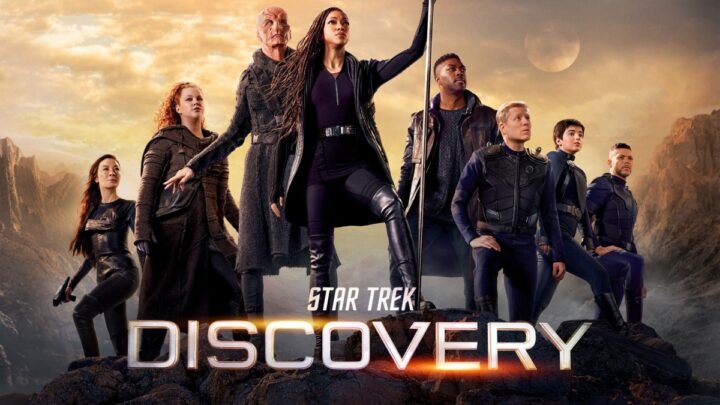
“Star Trek: Discovery” continues its interstellar odyssey with Seasons 3 and 4, offering viewers a captivating journey into the future. In Season 3, the crew, led by Commander Michael Burnham, catapults ahead to the 32nd century. Facing a changed galaxy and a mysterious cataclysm known as “The Burn.” This season explores themes of resilience, adaptability, and the enduring quest for hope in a post-Federation universe.
Season 4 continues the exploration with new challenges and adversaries, testing the mettle of the Discovery crew. The emergence of the gravitational anomaly known as the DMA (Dark Matter Anomaly) becomes a central focus. Prompting the crew to navigate the unknown while confronting moral quandaries.
Both seasons blend action-packed sequences with character development. Expanding the narrative scope of “Discovery” and contributing to the evolving saga of Star Trek.
Why is Star Trek so popular?
Cheers indeed to Star Trek’s distinctive charm. Its optimistic vision of the future and commitment to embracing diversity have set it apart and created a lasting impact on fans worldwide. In a genre sometimes dominated by darker themes, Star Trek’s shining beacon of hope resonates with its audience. Offering a glimpse into a future where unity and cooperation prevail. Here’s to the enduring spirit of optimism and the celebration of diversity that continue to make Star Trek a beloved and influential part of the science fiction universe!
Conclusion
Isn’t Star Trek just something else? Like, it’s not just about space adventures; it’s like this refreshing burst of optimism and embracing diversity, right? Star Trek’s like that cool friend bringing sunshine to the party in a sea of dystopian vibes. Imagine a future where we’ve sorted out our differences and are cruising through the cosmos together – that’s the dream! It’s no wonder the franchise has this magnetic pull on fans worldwide. So, here’s to Star Trek, to optimism, to our blog on how to watch Star Trek in order. And to a future where diversity takes center stage. Live long and prosper, dear friend!


